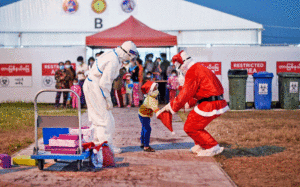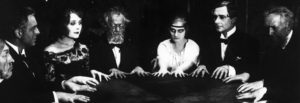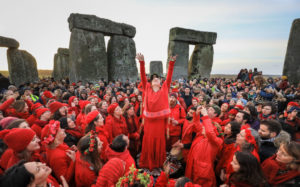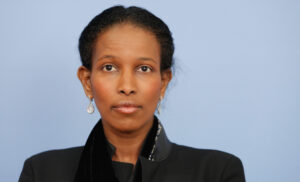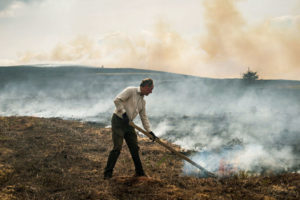Sometimes I think I’ve been lied to my whole life.
Everyone, everywhere, lives by a story. This story is handed to us by the culture we grow up in, the family that raises us, and the worldview we construct for ourselves as we grow. The story will change over time, and adapt to circumstances. When you’re young, you tend to imagine that you have bravely pioneered your own story. After all, the whole world revolves around you. As you age, though, you begin to see that much of what you believe is in fact a product of the time and place you were young in.
In my case, the time and place was Britain in the Eighties and Nineties, and the story we were immersed in then already seems like the product of a long-gone era. It was made up of the fading Christian heritage of England, the liberalism which had replaced it, an Enlightenment-era faith in science, reason and “progress”, and the much newer afterglow of the Sixties sexual revolution. This mess somehow gave birth to the weird combination of radical individualism and authoritarian thought-control that stalks the culture now.
Whatever the precise components, I grew up believing in things which I now look on very differently. To put career before family. To accumulate wealth as a marker of status. To treat sex as recreation. To reflexively mock authority and tradition. To put individual desire before community responsibility. To treat the world as so much dead matter to be interrogated by the scientific process. To assume our ancestors were thicker than us. I did all of this, or tried to, for years. Most of us did, I suppose.
Perhaps above all, and perhaps at the root of all, there was one teaching that permeated everything. It was to treat religion as something both primitive and obsolete. Simply a bunch of fairy stories invented by the ignorant. Simply a mechanism of social control. Nothing to do with us, here, now, in our very modern, sexually liberated, choose-your-own-adventure world. We were with Nietzsche, we moderns: we knew the God stuff was self-deluding balls, and soon enough the apostles of the New Atheism would be along to rub it in for us. Dawkins would sneer and Hitchens would bray and the pattern of the 21st century would open up before us: a slow, steady crawl towards a world unclouded by anything that could not be managed or measured by the people we believed we had become.
It was fun, in its way. Now that I look back, I almost wish it had been true.
*
A feast without a fast is a strange, half-finished thing: this is something I’ve only learned recently. We are coming up to the greatest annual feast of all, the one that most people, whether Christian or not, are going to end up celebrating. I’ve celebrated Christmas all my life, mostly with no religious trappings, and I’ve always loved it — more so since I became a father. But Christmas, in historical terms, is only one of a number of great feasts that make up the Christian ritual year, which was once — and still is in those parts of the world which continue to take it seriously — studded with saints days, festivals, processions, and feasts.
The Christmas feast is the last remnant, in the secular West, of this ritual year that made us. Since I unexpectedly became a Christian three years ago, I have thrown myself into it with the predictable gusto of a new convert, and it has helped me to understand something about the world I grew up in: we wanted the feasts without the fasts. This, in fact, is the basis of our economic model.
In the Eastern Orthodox Church into which I was baptised, as in the pre-Reformation Catholic Church in Europe, Christmas, like Easter, is preceded by a long fast. The Orthodox fast for 40 days before both major holy festivals, which are then marked by several days of feasting. The fast, as I can currently attest, sharpens the feast. It counts down the days, it provides a communal experience — everyone in the Church is following the same fasting rules together — and most of all it trains the body and the mind to do without, in the service of focusing on something higher. That, at least, is the theory. After doing this for 40 days, Christmas lunch certainly tastes better.
What happens, then, if you feast without fasting? What happens if your culture encourages you to feast every day, because your economy is predicated on endless, consumer-driven growth? Probably the same thing that happens if you decide that all borders, boundaries and limits, be they economic, social, sexual or cultural, must be torn down in the name of “freedom”. It’s like taking a child to a sweet shop and allowing him to eat anything he wants. For a while it’s fantastic, and then it isn’t. More, it turns out, is not actually better. More just makes you sick.
*
A century ago, the Irish poet William Butler Yeats and his new wife George were ensconced in their Norman tower house in County Galway, taking down dictation from the spirit world. Yeats had just published one of his greatest poems, The Second Coming, which reads like a news report from the 2020s:
Turning and turning in the widening gyre
The falcon cannot hear the falconer;
Things fall apart; the centre cannot hold;
Mere anarchy is loosed upon the world,
The blood-dimmed tide is loosed, and everywhere
The ceremony of innocence is drowned;
The best lack all conviction, while the worst
Are full of passionate intensity
William and George were newlyweds, and only a few days after their wedding, George, who shared Yeats’s passion for the esoteric and occult, had begun to produce what spiritualists back then called “automatic writing”. Both came to believe that, as the text progressed, they were being given access by something or someone to what Yeats called “a system” that explained the narrative arc of human history. Yeats later laid out this “system”, based on George’s writings, in his strangest book, A Vision, published in 1925.
The symbolism contained in The Second Coming doesn’t make much sense without reading A Vision. What, for example, is this “gyre” and why is it “widening”? Who or what is the “rough beast” which the last stanza chillingly sees “slouching towards Bethlehem to be born”? A Vision answered the questions. Yeats and George had come to see human history as a series of “gyres” rising and falling according to a predictable pattern. A gyre, Yeats explained, is like a cone of time. It begins as a tiny circle, then spirals outwards and forwards, widening with each revolution. When it reaches its widest point, it is unable to hold together. The “widening gyre” begins to break down under the centrifugal pressure, and a historical epoch crashes to its end. But as this is happening, a new gyre is being born within the first, spiralling out in the opposite direction. In the death of one world is sown the seeds of the next.
Each gyre, wrote Yeats, has a fixed timescale of around 2,000 years. The Second Coming is the story of the end of the gyre which began in Nazareth 2,000 years ago. The “Christ gyre”, Yeats prophesied, would come to an end in the 21st century. Something else, then — some rough beast — would begin its slow, slouching rise.
*
In the late 19th and early 20th centuries, cyclical theories of history, like occultism, were all the rage. René Guénon, Arnold Toynbee, Oswald Spengler: the bookshelves were groaning with them. It was obvious enough, in the shadow of the Great War, that something was ending, and the most perceptive observers could see, in the rise of occultism and sexual libertinism, technological warfare and globalised capitalism, Marxism and fascism, what it was: the values and the heritage of the old Christian West. Religion as a way of seeing had been supplanted by a can-do materialism, which sought to transform reality through ideology, technology and science. God, as Nietzsche’s madman had yelled before Nietzsche himself did, was dead. The modern West had killed him.
Oswald Spengler, on the other hand, was not so sure. Like Yeats, the German poet-historian saw history as a series of cycles. His mega-study, The Decline of the West, which became an unexpected bestseller across Europe in the aftermath of World War One, detailed the rise and fall of various global cultures, the latest of which — ours — he called “Faustian culture”. Faustian because it had made a deal with the devil, which was now, according to Spengler, about to come due. The West had triumphed in the goal it had set itself: corralling matter through science and technology. We had become masters of the material realm and had conquered much of the world, but like Faust we had sold our soul for it. “We are the hollow men,” intoned T. S. Eliot, a traditionalist disguised as a modernist. “We are the stuffed men.” He had it right. You can be both at once.
By the time Spengler was writing, he was already clear that all of the theoretical edifices constructed by the West to replace its old sacred order — which mainly manifested as political ideologies — had failed. Beginning in the 21st century, he predicted, the grandchildren of the revolutionaries and the rationalists, adrift in a failing materialist culture, would begin to seek succour in another place entirely:
“The age of theory is drawing to its end. The great systems of Liberalism and Socialism all arose between about 1750 and 1850 … Belief in programme was the mark and the glory of our grandfathers — in our grandsons it will be proof of provincialism. In its place is developing even now the seed of a new resigned piety, sprung from tortured conscience and spiritual hunger, whose task will be to found a new hither-side that looks for secrets instead of steel-bright concepts.”
The West’s gyre was ending, said Spengler. Exhaustion and decline would follow, but the failure of both technology and ideology would prompt a turn back towards the spiritual. “Before us,” he declared, “there stands a last spiritual crisis that will involve all Europe and America.” Beginning in the 21st century, this would manifest as what he called a “second religiousness”. The Faustian West would experience a religious resurgence. Spengler predicted that it would begin around now.
What if a human being is not primarily a rational, bestial or sexual animal but in fact a religious one? By “religious” I mean inclined to worship; attuned to the great mystery of being; convinced that material reality is only a visible shard of the whole; able across all times and cultures and places to experience or intuit some creative, magisterial power beyond our own small selves. There is, after all, no current or historic culture on Earth that is not built around God, or the gods. None, that is, apart from ours.
If this is true, then it would make sense that the collapse of the false picture painted by the age of “science and reason” — mind-body dualism, religion as evidence of superstition or stupidity, the ability of ideology or technology to create paradise on Earth — would bring about a return to the mean. And if the mean is what we might call a religious sensibility, then a resurgence of religion itself would be very much on the cards.
I think there is a good chance that, beneath all of the surface culture war battles, below the arguments about free speech and democracy, coursing below all of these necessary and inevitable cultural strains and tensions, this is already happening. It could be that Spengler’s second religiousness is already here.
*
If this is so, what shape will it take? Many different shapes, probably, and all at once, with the first being an old and a familiar one. In recent years, more and more people have begun to notice that, as the tide of Christian culture has receded in the West, the place seems in some way to be re-paganising, and that as it does so it is offering up a new set of sacred values. What might those values be? We could start with nature worship, self-worship, and a sacrificial attitude to disposable human lives. Then we could combine these with the increasingly obvious religious vision of the Silicon Valley crowd, with their AI Gods and pursuit of silicon transcendence. Add it all up and we can make out the dim shape of the second religiousness in what passes for the cultural mainstream: self-creation in a Godless, genderless, borderless, natureless world of all-seeing living machines. Welcome to the silicon paganism of the 21st century.
In response, we are now beginning to see a resurgence in genuine religion. Personally, and anecdotally, I am noticing this everywhere. In American Orthodox churches bursting with young families. In atheists or neo-pagans suddenly becoming Christians (I plead guilty). In my own speaking events about Christianity, which are suddenly inexplicably popular, and not because of me. Others I know report the same thing: for the first time in a long while, people are beginning to take faith seriously again. Actual religion — the thing that was supposed to die a slow death at the hands of reason — is emerging slowly from the shadows as the new paganism takes hold.
But as Spengler himself warned, there is no guarantee that a “second religiousness” will be an entirely benevolent thing. Knowing what we do of human history, in fact, we can pretty much guarantee that it won’t. There have always been two kinds of religion, or perhaps two ways of responding to religious teachings. There is the internal or mystical response, and then there is the worldly or political one. In Christian terminology, we might call these the way of the world and the way of the kingdom. Christ taught that the path home to God — which is the path to the true self — is a narrow one, and that few ever find it. He also explained that God was to be found not in the clouds or in the stars, but in every human heart. The Christian Way, as its first followers referred to it, is in other words a path of internal transformation — what the Orthodox call the “unseen warfare” that goes on in the heart every minute. The battle between the way of God and the way of the world: every religion I know of teaches some version of this.
Being human, though, we like to take these teachings and overlay them onto the world. In Christian history, this has often taken the form of crusading — sometimes literally — to transform the kingdom of Man into the kingdom of God by force. Unfortunately, since the people doing the crusading have not first fought their own unseen war to transform themselves, they end up falling into a neat little trap set by the devil, and transforming the Church into an instrument of repression, or simply a vehicle for worldly political activism. This can apply equally to liberal Christians who want to remake the Church in the rainbow flag-bedecked image of the “social justice” Left, and to conservative Christians who want Jesus to lead their battle to defend “faith, flag and family” against the woke libs.
Currently, this trend is manifesting most obviously in the form of a “cultural Christianity” promoted by anti-woke public figures on the Right. In this reading, the Christian Way is a weapon which can, in the words of Ayaan Hirsi Ali, writing here as a recent convert, “fortify us against our menacing foes”. Ironically, this spiritual-warfare-as-civilisational-warfare attitude is most obvious at present in the rise of the violent Islamism which so frightens Hirsi Ali, and with good reason. The nervousness with which Europeans have been shopping in their Christmas markets this month is testament to the reality of the violence which some people think God will help them justify. The warning should be clear.
If all of this is part of the second religiousness, it won’t work: or at least, it won’t take us any closer to God. Religion, despite the many calcified failures of its history, is not at root a weapon in anybody’s culture war. Religion and culture reign in separate domains. A faith wielded as a stick with which to beat the “cultural Marxists” will end up being as empty as the consumer void it seeks to challenge, and potentially as toxic. C. S. Lewis had already spotted the trap more than 60 years ago: “Religions devised for a social purpose, like Roman emperor-worship or modern attempts to ‘sell Christianity as a means of saving civilisation’, do not come to much. The little knots of Friends who turn their backs on the ‘World’ are those who really transform it.”
What Lewis is describing is Christ’s narrow way: the path of the Desert Fathers rather than that of Emperor Constantine. The divine irony is that it is only by walking away from the world that we have any chance of changing it. The future, though, like the past, will probably offer up both paths. We should expect a second religiousness to lead to new Desert Father-like movements, away from the world and into the wilderness, and at the same time give us more openly religious conflict in the public sphere. The two have always been related. The original Desert Fathers, back in the 4th century, fled to become hermits in the sands of Egypt in part to escape the newly civilised version of the Christian faith, which had recently become the official religion of the Roman Empire. Christianity and Empire have never mixed well. When God came to Earth, after all, He turned up as a barefoot carpenter, not a proconsul, and he had nothing at all to say about politics, despite living at a time of deep political ferment in an occupied nation. He had bigger fish to fry. I think we should assume He knew what he was doing.
*
Western culture seems in many ways to be visibly collapsing before our eyes. Our nations, our family structures, our communities, our assumptions, our ecosystems: everything is under strain, under attack or bursting at the seams. What is the cause? Is it mass immigration? Is it post-modern relativism? Is it the woke Left? Is it the far-Right? And what is the solution? Is it a robust defence of “enlightenment values”? Is it writing free speech into law? Is it border control? Is it even more YouTube videos?
I think that all of this is just a form of temporary displacement activity. I think the real story is that our religious sensibility is slowly revealing itself to us again, emerging blinking into the light; our instincts are trying to return to their source. On some level we perhaps know this, but we are holding it off as long as possible, because to turn around and look into the light would be to accept that our whole culture has been trailing down a dead-end road since the Enlightenment. We can’t look at that fact, so we look at absolutely everything else instead. But the confrontation can’t be put off forever.
The biggest lie my culture told me was that matter was dead, along with God, and that humans could reason their way to freedom. Reason has its uses — it is a gift we are given, and we should wield it, like technology, as wisely as we can. But at root, humans are fundamentally spiritual animals. The future is not atheists in space. The future, like the past, will be religious. Even the the rationalists and the soldiers-of-Enlightenment are wobbling on the ground from which they once scoffed so proudly at the babushkas and the saints. It may be that the new gyre is beginning, quietly, to turn.
Our crumbling culture can be so hard to navigate. Religion can be hard to navigate too. But maybe Christmas can help us understand what it is, and what part of us it services. Religion is not, as atheists often assume and I once assumed too, a set of beliefs to be adhered to, or arguments to be made and defended. It is an experience to be immersed in. The orthopraxy reveals the orthodoxy. Fasting makes no sense until you fast. Praying is meaningless, even embarrassing, until you start to pray. If the Christian path is straight and narrow, we can do nothing but try to walk it, even if we keep falling off. God makes no sense until you start to talk to him. Then, strangely enough, all sorts of other things start to make sense too. It is hard, if not impossible to explain, and yet it is the simplest thing in the world. We have always done it. We always will.
I remember the first time I tentatively stepped into an Orthodox church to attend a Divine Liturgy. I had no idea what to do, or what to expect, or whether I even really wanted to be there. From the outside, to the Western mind, it all looks intimidatingly Byzantine — not to mention extremely long. But something happens when you stand, immersed in it all. You come to feel as if you are being carried down a great timeless river to an almost unfathomable destination that you could never reach on your own. But of course, you are not on your own. Not now. You will never be on your own again. You have come home.
Disclaimer
Some of the posts we share are controversial and we do not necessarily agree with them in the whole extend. Sometimes we agree with the content or part of it but we do not agree with the narration or language. Nevertheless we find them somehow interesting, valuable and/or informative or we share them, because we strongly believe in freedom of speech, free press and journalism. We strongly encourage you to have a critical approach to all the content, do your own research and analysis to build your own opinion.
We would be glad to have your feedback.
Source: UnHerd Read the original article here: https://unherd.com/

